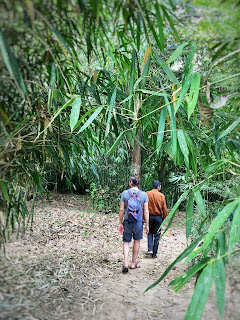Eco-Tourism | Farming | Sustainability: India
🎋 URAVU BAMBOO VILLAGE 🎋
Eager to learn about sustainable forms of eco-tourism and farming in southern India, we rattled along in a vintage Ambassador, to the little village of Thrikkaipatta, high up in the misty rainforests of Wayanad, Kerala.
Thrikkaipatta is blessed with a lush tropical climate and the ability to grow many food types including: rice, pepper, coffee, pineapple, jackfruit, banana & papaya.
In this village, a forward-thinking group of locals set up Uravu Eco Links, a sustainable, eco-friendly tourism venture that both involves and benefits the local community. They work work in the areas of sustainable construction, bamboo trading, workshops and eco-friendly community tourism. The villagers play a role in the project, which features innovative building designs based on environmental standards, using locally sourced materials, and which make use of the ideas of local artisans. These designs have made use of local knowledge of sustainable construction in the areas of architecture and design, engineering, innovative water and energy management, tourism, and craft.
 |
| Bamboo Nurseries, Uravu |
_______________________________
Uravu's initiatives include:
- Bamboo handicraft workshops at the Uravu Indigenous Science & Technology Study Centre. This not-for-profit bamboo-based developmental organisation strives for rural empowerment through sustainable solutions. They provide secure employment for women & those with diffrabilities, thereby reducing rural poverty. Their strategies overcome resource scarcity and marketing challenges faced by Indigenous village knowledge systems. Very importantly, they tap the potential of Bamboo and establish its credentials as the ultimate wood, plastic and iron substitute. A group of skilled female bamboo artisans make beautiful products to sell in the shop, and also lead visitor workshops. Visit Uravu for further information & available products.


- Responsible eco-tourism with guests having a choice of six family homestays. Other families, that can not offer beds, provide delicious cooked meals in order to share visitor revenue. We stayed in several types of bamboo accommodation to experience different homes & meet several families. Visit Uravu Bamboo Grove for some examples of accommodation available.
_______________________________
We loved this sustainably concept & the villagers’ positive energy so much that we changed our travel plans, stayed for an extra week & got involved in community activities:
🌾 Visited farms learning about spice, coffee & crop production and permaculture initiatives
💃🏻 Led a creative dance class on the roof of a hostel for marginalised tribal girls. In return I was treated to a basic Bharathanatyan classical dance lesson with beautiful young teacher Aparna. I hope to collaborate in the future together.)
🍵 Learned to cook traditional Keralan dishes in the villagers’ homes

🎍 Made bamboo handicrafts (as a crafter, this was a massive highlight!)
🎉 Attended a housewarming party alongside the whole village, which included a performance of the mesmerising Theyyam!
Theyyam is a ritual art form so ancient it predates Hinduism (500 BCE), from a time when tribal animism was the most common form of worship. These roots are still evident: trees, plants, and animals are worshipped alongside Hindu gods. Music is also an important part of the ritual. Traditional instruments such as the Chenda, Elathalam, Kurumkuzal, and Veekkuchenda are used.
Northern Kerala is the place to witness magical Theyyam performances with peak festival season running December-February. The rich colours, deafening rhythmic drumming & storytelling remain intensely thrilling to us.
Group celebrations are integral to Indian community culture & we've come to love the massive Indian weddings (despite always feeling overwhelmed during the event!)
 |
| Classical instrument Sitar played beautifully by local music teacher |
_______________________________
It is deeply inspiring to see how a group of thoughtful people can co-exist in harmony, without exploiting others or their natural resources, living in a simple way and respecting nature 🌿
I’m particularly interested in the role of women in different societies and empowerment vs suppression, so I interviewed a couple of bakers from Thrikkaipatta's often-marginalised tribal community which which you can read here.
_______________________________
We had lots of fascinating discussions with members of the community about how things work locally, regionally and nationally in India.
It’s really important that travel is an opportunity to share ideas & exchange skills. There is so much we can learn from others and can offer in return.
Teacher Aparna painted it best...
 |
| You are not rich until you have something money can't buy |
As our first trip to Thrikkaipatta was purely spontaneous, we filled a backpack with Uravu's bamboo treasures, hugged our new friends goodbye, and promised to return one day for planned collaborations and workshops.
 |
| The bamboo that bends is stronger than the oak that resists |







































Comments
Post a Comment